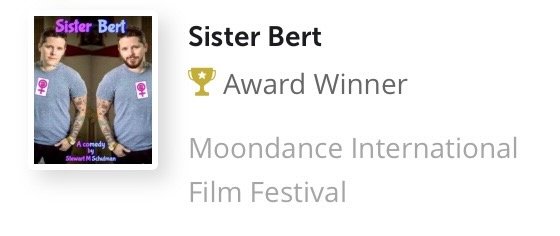BOTH
Screenplay by Stewart Schulman
It’s summer in the city in 1997. New York’s downtown art scene is flourishing. Digital photography is changing the way we see the world. Against this backdrop handsome portraitist, Steven, meets Yale Alumni Relations Director, James, and falls in love. And it’s great, except that James is just recently ‘out,’ still married, and “for his kids’ sake,” living with his wife and three young daughters in New Haven. A problem Steven’s willing to work with, because James is truly special.
Steven’s pretty special too. He’s a successful photographer, currently working with his assistant, Jade, on a cutting edge digital photography project—a photomosaic self-portrait comprised of moments from his life. Steven and Jade are friends, soul-mates even, who’ve grown to love and respect one another in the months since she took the job. And their friendship doesn’t threaten Jade’s relationship with her boyfriend, Cullen, a handsome, rising star in the world of Southern politics. What does threaten it is that Cullen lives in Atlanta, and even though she can’t articulate it, Jade’s just a little bit in love with her gay boss. But is Steven really even gay? He’d been with women in the past, until a bad affair left him denying his bi-sexuality and opting to live exclusively as a gay man.
At its core, BOTH is about three friends trapped in a world that demands they conform to society’s ‘acceptable norms’ and questions the veracity of their inherent natures. In their struggles to live their respective ‘truths’, they find one another and help each other break free. Only in so doing, each of them ends up caught between two opposing loves, in three intersecting love triangles, making BOTH an impossible love story—a romance coupling the metaphor that life is essentially a mosaic of our own creation, with a searing exploration of the ambiguities of sexual identity and the true power of love.
Gold Award: Best Original Dramatic Screenplay
SISTER BERT
Screenplay by Stewart M. Schulman
“When you stop laughing, you won't know what sex you are.”
It’s July 2017. Real estate development in Manhattan is booming, and ‘small guys’ are getting pushed out everywhere—like the tenants of one Tenth Avenue block in Hell’s Kitchen. Three longtime institutions—The Shelter for Women In Crisis (SFWIC), Schwartz’s Deli, and Minnie St. Bernard’s Women’s Theater—are being forced out by Minnie’s ex-husband, Morty, and his new real estate syndicate who plan on replacing those buildings with a 60-story skyscraper of luxury condos. But no one is going anywhere without a fight!
Norm Schwartz and his sister, Bert, are fraternal twins. Norm is straight. Bert is gay. They live above the Schwartz family deli, along with Norm’s blind girlfriend, Faith, a gifted healer, who works out of their home. Norm’s a struggling playwright. Bert’s a struggling actress. They’re both desperate for success. Minnie’s desperate for a hit radical feminist play to ‘save’ her theater from Morty’s construction plans. And Sister Luisa, head of the SFWIC, needs a miracle to save her shelter. It’s Minnie’s new assistant, Eve, who unwittingly brings everyone together, and creates the ensuing madness.
Eve gets Norm to write a one-woman play for his radical dyke feminist sister, Bert, and then gets Minnie to produce it. Only, the ‘star’ of the show gets herself arrested defending helpless innocents at the shelter, and there’s no one who can be ‘her’ in the play. Or… is there? Of course there is! And when that person assumes the role, everything spins out of control! But… it also helps everyone find empathy and act more lovingly in a world gone totally wrong.
Best Feature Screenplay
BEYOND MEASURE
Screenplay by Daniel Schulman & Stewart Schulman
‘Beyond Measure’ is a drama about what happens when real-life turns out to be less than our dreams. The story of a long and turbulent friendship between two women who are opposites, and the healing power of their love.
In the mid-1950’s, Annette was a young concert-pianist with big dreams and a promising future--a black woman with the chance to transcend color barriers in the world of classical music. With her white best friend Betty--a free-spirited, classically trained opera and jazz singer—Annette dreamed of setting up a ‘Conservatory of Music’ similar to the one established by their mentor, the legendary Heather Hazelton (the first black woman to break the color barrier as a concert pianist). But their dream never came to pass. Marriage, family, the passage of years, came instead. And the two friends, "Nettie & Betty"--once closer than sisters--have been bitterly-estranged for over ten years. Today, in 1986, at 54, Annette is a middle-aged, middle-class, seemingly-contented suburban housewife and mother of three grown children, living ‘happily’ in Philadelphia, with her loving, conservative husband, David. Only these days, with her kids gone, something inside her isn’t quite right.
When a surprise visitor comes to Annette’s home with disturbing news about Betty, Annette’s PAST and PRESENT collide. Critical turning points in her professional and personal life flash before her, and she realizes that she sold her creative dreams for security, and wonders if with a little more courage, she might’ve had both. But could she have been an artist and a wife and mother at a time when careers for women of color were limited? She might have ‘had’ both, or ‘lost’ both. Who can know? But now, with the help of an ailing Betty, Annette is being given a second chance to follow her heart and pursue her musical dreams—if only she can find the courage and the willingness to try.
LA MACHA
Screenplay by Daniel Schulman & Stewart M. Schulman
‘La Macha’ is a story of Destiny—the triumph of idealistic Democracy during the Costa Rican Revolution in 1948. Based on the true life story of Henrietta Longstreet Boggs, it is the epic tale of a magical time when determined men and women saved a nation from sliding into Communist dictatorship--creating instead one of the strongest Democracies in the Western Hemisphere.
‘La Macha’ is also an intimate love story between José ‘Don Pepe’ Figueres, a coffee planter, (known as “the grandfather of modern Costa Rica,”) and his extraordinary American wife, Henrietta, who in 1940, at twenty, left Alabama for a three-month visit to Costa Rica, that lasted ten years. Henrietta and Pepe met, fell instantly in love, married, and lived an idyllic life, for a time, on Pepe’s finca (farm) which he called “La Lucha Sin Fin,” (“The Endless Struggle” ), until one day the winds of war interceded, and blew them on a path they had no choice but to follow. A path that compelled Pepe to speak out against the corrupt government destroying his country’s democracy, leading to his exile, and the pair wandering through El Salvador, Guatemala, and Mexico, as Pepe planned the coming revolution in his mind. A revolution Pepe led in 1948, with Henrietta fighting by his side. A revolution which ended victoriously with Pepe as President of The Second Republic of Costa Rica and Henrietta, his First Lady.
Yet ‘La Macha’ is ultimately the story of a romance with a heartbreaking end. Though their love lasts, the marriage can’t withstand the pressures of their political life together, and the lovers part, as Henrietta returns with their children to the States, leaving Pepe and her beloved “Land of Eternal Spring” forever behind.







